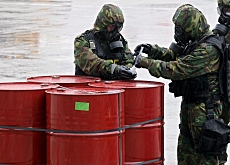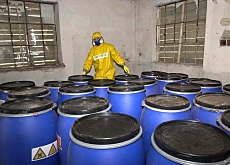Convention parties consider chemical HQ idea

Countries which have signed up to the Rotterdam Convention have agreed to consider a Swiss proposal to combine the secretariats of three UN chemical conventions in Geneva.
The convention conference in Rome also granted Switzerland the chair of a committee that will propose the admission of new chemicals to the convention.
The Rotterdam Convention, in force since 2004, regulates the international trade of certain hazardous chemicals. It stipulates that the export of the most dangerous pesticides and chemicals can only be authorised with the “prior informed consent” (PIC) of the receiving country.
To date 41 chemical products, including pesticides and industrial chemicals, are subject to the PIC principle.
The conference, which closed on Friday, also established a chemical review committee that will assess future proposals to add new chemicals and pesticides to the PIC list. Bettina Hitzfeld of the Swiss environment agency will chair this committee for one year.
Final duty
The head of the Swiss environment agency, Philippe Roch, represented Switzerland at the Rome conference, his final duty before stepping down from his post.
Roch strongly supported the idea of combining the three secretariats of the Rotterdam, Stockholm and Basel conventions governing different aspects of the movement, use and disposal of chemicals in one location.
“The question now is how to organise them [the secretariats] and to avoid duplication of tasks, especially on an administrative and strategic level. We are in favour of maintaining the secretariats but under one head and within one administrative organisation,” Roch told swissinfo.
There are annual conferences for each of the three conventions and all three conferences have to agree on a common document to arrive at a final decision.
Roch expects the process to be completed next year.
swissinfo with agencies
The Rotterdam Convention, in force since 2004, covers the international trade of certain hazardous chemicals. It stipulates that the export of the most dangerous pesticides and chemicals can only be authorised with the “prior informed consent” (PIC) of the receiving country.
The Stockholm Convention aims to introduce a worldwide ban on the production and use of Persistent Organic Pollutants (POPs), which are harmful chemicals in the environment that build up through the food chain.
The Basel Convention on the Control of Transboundary Movements of Hazardous Wastes and their Disposal is a comprehensive global environmental agreement on hazardous and other wastes.

In compliance with the JTI standards
More: SWI swissinfo.ch certified by the Journalism Trust Initiative


You can find an overview of ongoing debates with our journalists here. Please join us!
If you want to start a conversation about a topic raised in this article or want to report factual errors, email us at english@swissinfo.ch.